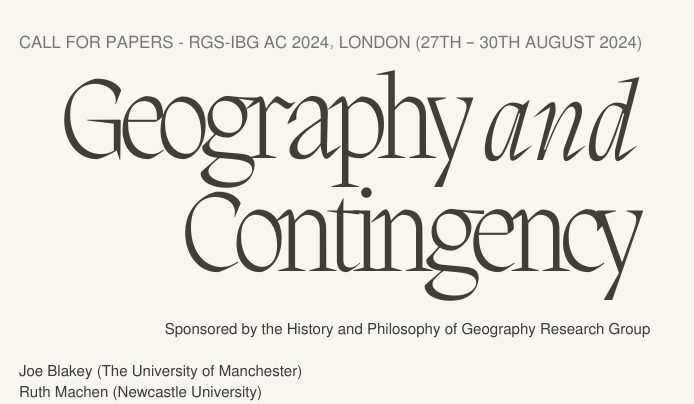CfP for session: Geography and Contingency
Sponsored by the History and Philosophy of Geography Research Group
Joe Blakey (The University of Manchester)
Ruth Machen (Newcastle University)
This session explores contingency’s evolving conceptual significance and role within Geography. Contingency is often overlooked yet core to geographical concerns (Barry 2016). Moments of contingency invariably occur within spatial and temporal contexts, whilst contingency’s rejection of necessity and determinism resonates with post-structural paradigms infusing geographic thought (Ermakoff 2015; Jong 2023; Simandan 2010). The concept therefore finds prominence across diverse geographical domains, including critical realist, assemblage, postcolonial, and post-foundational enquiry (Ash 2020; Barry 2016; Landau-Donnelly and Pohl 2023). However, while contingency was arguably once fetishised (Simandan, 2010), we detect occasional scepticism towards it (c.f Harvey 1987), or at least caution that contingency can be over-emphasised (Ash 2020; Simandan, 2010).
Geographers engage contingency explicitly and implicitly, in often distinct ways. Beyond its everyday sense of dependence on certain conditions, contingency may signify sensitivity to minor variations, unpredictability and indeterminacy (Simandan 2010; Sterelny 2016; Herrick 2016; Ermakoff 2015). Often slippery, it can be a discursive device, process, or set of properties (Nicols 2019; Ermakoff 2015) and may be incidental or instrumental. Encapsulating contradiction and unresolved tensions, contingency both signals potentiality and political possibility (Herrick 2016; Nichols 2019; Landau-Donnelly and Pohl 2023; Anderson 2010), and establishes particular boundaries, orders and affects, for instance feeding machine-learning algorithms that profit from disorder (Amoore 2023). It alludes to how difference, responses, and futures might emerge, but also how we anchor ourselves amidst uncertainty (Barry 2016).
We invite theoretically engaged contributions advancing geographical understandings of contingency across diverse empirical and thematic domains. Submissions may explore:
How do conceptualisations of contingency differ and converge?
How else might contingency be thought?
What are the geographies of contingency?
How is contingency geographical?
How is contingency encountered in fieldwork?
What are the traps and opportunities in thinking with contingency?
How might contingency be approached methodologically?
Please send abstracts to joe.blakey@manchester.ac.uk or ruth.machen@newcastle.ac.uk by Friday 23rd February.
List of References
Amoore, L., 2023. Machine learning political orders. Review of International Studies, 49(1), pp.20-36.
Anderson, B., 2010. Preemption, precaution, preparedness: Anticipatory action and future geographies. Progress in Human Geography, 34(6), pp.777-798.
Ash, J., 2020. Flat ontology and geography. Dialogues in Human Geography, 10(3), pp.345-361.
Barry, A., 2016. The Politics of Contingency. DFG Working Papers Series 19. Available from: https://lost-research-group.org/wp-content/uploads/2017/05/SPP1448_WP19_Barry.pdf [lost-research-group.org]
Ermakoff, I., 2015. The structure of contingency. American Journal of Sociology, 121(1), pp.64-125.
Harvey, D., 1987. Reconsidering social theory: a debate. Environment and Planning D: Society and Space, 5(4), pp.367-434.
Herrick, C., 2016. Global health, geographical contingency, and contingent geographies. Annals of the American Association of Geographers, 106(3), pp.672-687.
Jong, A., 2023. Social configurations in the moment of post-foundationalism. Frontiers in Sociology, 7(1078011).
Landau-Donnelly, F. and Pohl, L., 2023. Towards a post-foundational geography: Spaces of negativity, contingency, and antagonism. Progress in Human Geography, 47(4): 481–499.
Nichols, C.E., 2019. Geographic contingency, affective facts, and the politics of global nutrition policy. Geoforum, 105, pp.179-190 Sterelny, K., 2016. Contingency and history. Philosophy of Science, 83(4), pp.521-539.
